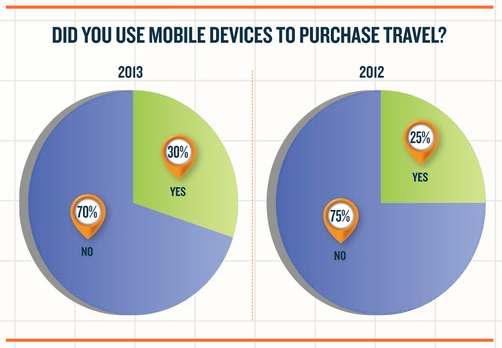
In December 2012, I wrote a piece called The Mobile Revolution in Travel about recent trends and reports that painted what seemed to be an optimistic portrait regarding mobile adoption rates and its impact for the travel industry.
Less than a year later, it appears as if reports were, if anything, very conservative: the growth is in fact staggering!
MOBILE BOOKINGS ARE BOOMING
All the statistics show sheer growth, not only for smartphones but also tablets and other wireless devices, i.e. iPods. According to a recent study by Tradedoubler Insight Unit, tech-savvy European travelers are ignoring travel agents and instead using mobile and online sites to book their vacations.
This study looked at the online behavior of 2,500 smartphone users from Britain, France, Germany, Italy, Netherlands, Spain, Sweden and Poland. Overall, 19% of these tech-savvy travelers booked their vacation through their mobile device. But if you dig a little deeper, you’d find that in the 25-34 years old demographics, 28% of users say they now book their holidays from the comfort of their mobile phone!
This should come as no surprise, though. Google Travel found that 25% of all online search for travel came from a mobile device at the end of 2012 and eMarketer predicts that this figure would jump up to 40% by the end of 2013. Well, lo and behold, it seems we’re already there!
Mobile travel is here to stay
Looking at results gathered during Q1 2013 for the various hotels across North America managed by HeBS, a New York-based agency, we find that 39.5% of all online traffic came from either a smartphone or a tablet – in 89% of cases, an iPad.
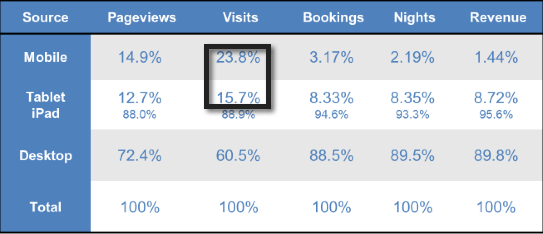
As can be seen in the chart above, while there is a considerable amount of traffic generated from mobile devices, bookings & revenues remain a small fraction.
Nevertheless, it now represents more than 10% of revenues, and growing! So much so, in fact, that PhoCusWright estimates it should reach 20% of online travel dollars in the U.S. by end of 2014, when mobile bookings will reach US$25.8 billion.
Yet, another aspect that requires marketers’ attention is the fact that while bookings may remain on the lower end of the spectrum, mobile is increasingly important at the research level.
Thus, travel brands should ensure they have optimal mobile sites and/or applications to properly capture their fair share of bookings, whether this eventually comes through a mobile device, laptop, desktop or even call center. This recent study and infographic from Mobiquity sheds some interesting insights on the matter.
MOBILE IS MORE THAN A CHANNEL
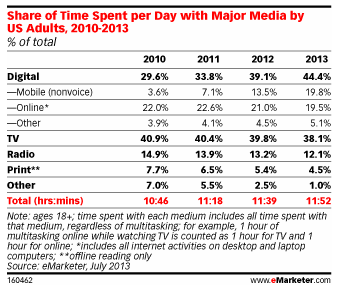 At the end of the day, however, we need to grasp and understand that mobile devices are taking an omnipresent role in our everyday life and that they represent more than just “another channel” to market, communicate or advertize through.
At the end of the day, however, we need to grasp and understand that mobile devices are taking an omnipresent role in our everyday life and that they represent more than just “another channel” to market, communicate or advertize through.
In fact, eMarketer recently found that for the very first time, as of this year time spent on nonvoice mobile activities will surpass time spent online on desktop and laptop computers!
We have a much closer relationship with our mobile devices than we would with the office desktop or even a personal laptop. Some bring their smartphone with them to the washroom, others bring their tablet to bed for nighttime reading… it has therefore become a lifestyle item, above and beyond its useful and inherent attributes.
Takeaways:
- Not all mobile is mobile. Treat smartphones and tablets differently, and have a distinct strategy for each. Behavior and willingness to spend are not the same, whether in research mode or in booking mode, according to different devices.
- Online travel agencies (OTAs) have taken a clear leadership in this space yet again, with mobile applications and mobile sites adapted, in some instances differently according to tablets or smartphones. Hotels, airlines, cruise lines, restaurants and destinations should take a few notes from their best practices.
- Have a mobile marketing strategy in place and appropriate dollars to fund future initiatives. If it’s too late for 2013, then it’s certainly time to prioritize this for 2014 strategy planning sessions that are taking place in various travel brands headquarters right now…
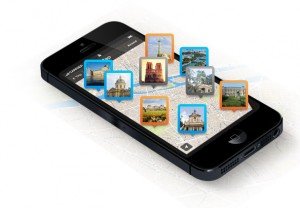
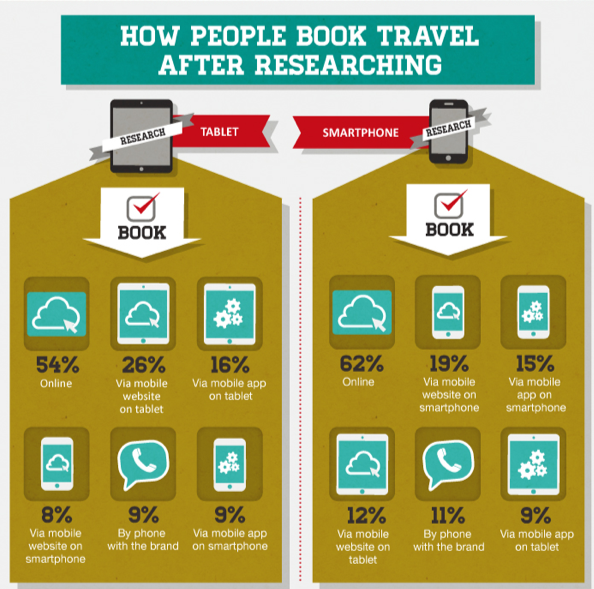









Leave a Reply